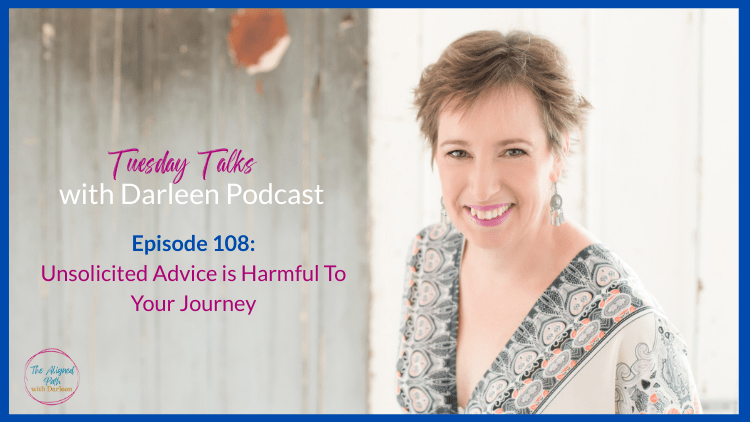Let’s talk about something that really matters: the harm caused by giving advice that hasn’t been asked for. I’m not talking about a soft suggestion or a gentle offer of support, I’m talking about jumping in with solutions, direction, or opinions when the person hasn’t opened the door to receive them.
It happens a lot in the business world, but it’s just as present in personal life. And it can be incredibly damaging, emotionally, mentally, even physically. Not because the advice itself is always wrong, but because of the way it’s delivered, and more importantly, when it’s delivered without consent.

EPISODE 108: Listen using the player below, or click the links to your fave platform to subscribe and listen over there:
You Never Know Where Someone Is On Their Journey
This is one of the most important truths we often forget. No matter how close you are to someone, you never fully know what they’re going through. You don’t know their mindset, their physical health, their emotional state, or what’s already on their plate.
You might see someone pause or take a step back and assume they’re lost. But maybe they’ve just completed a big emotional process and need rest. Maybe they’ve intentionally carved out space to take care of themselves. And your advice, especially if it’s given abruptly or harshly, might completely derail that.
Your words may seem helpful, but the impact could be the exact opposite. Without realising it, you could send them into doubt, trigger old wounds, or extend their healing process. And once that happens, it takes far more effort to get back on track.
Just Because You’re Close Doesn’t Mean You Know
There’s a pattern where people assume that because they’ve had deep conversations with someone, they now understand their business. But knowing someone’s business from the outside is very different from being inside it. You don’t know all the other strategies, support, and intentions they’re working with.
Even if they’re a good friend, even if you’ve helped them before, if they haven’t asked for your advice, don’t give it. Keep your mouth shut. And I say that with love.
We’re so quick to assume we know what’s best. But often, our advice isn’t about them at all. It’s about us, about wanting to fix, be helpful, or feel needed. And that’s where things can get murky.
Your Energy Affects the Message
Even when advice is asked for, your energy matters. If you’ve just attended a course that got you all fired up, possibly even a little aggressive, and you turn around and give advice from that place, it won’t land well. It’ll feel sharp. Overpowering. Uninvited.
Now imagine doing that when no one even asked for your input. That’s when it crosses the line from unhelpful to harmful.
You may think you’re doing them a favour. But you could be introducing doubt, confusion, or guilt that wasn’t there before. And for someone who’s already sensitive or going through something personal, that kind of interaction can knock them off course.
You Might Be Undermining Their Success
There’s this idea that success looks the same for everyone, like earning six or seven figures, being on every platform, scaling fast. But that’s not true. Success is deeply personal.
Some people want a business that supports their family and energy. Others want to keep things small and grounded. And when you come in telling them to do more, be on more platforms, or change their strategy, you may be undermining the quiet success they’ve already built.
You may cause them to question whether their version of success is valid. Whether they’re falling behind. Whether they’re doing enough. And that kind of pressure doesn’t serve anyone.
I once had someone tell me I should be on TikTok because my niche wasn’t on Facebook. That hit me hard, not because I agreed, but because it was said with such certainty, as if I didn’t know my audience. But I do. I know where they are. And I know what works for me.
Some Things Are Not Your Business
Let’s be honest, some things just aren’t yours to comment on. If you’re not their coach, not their strategist, not in a professional advisory role, then stay in your lane. Don’t jump into someone else’s business unless they invite you in.
And even if you are being paid to help, remember that not all advice is right for every person. You still need to tune into their energy, their goals, and their way of working. Cookie-cutter guidance can be just as harmful as unsolicited feedback.
If someone is paying you, they’re trusting you. That trust comes with responsibility, to hold space, to ask first, and to always check in with how your energy is landing.
Five Reasons Why Unsolicited Advice Is Harmful
Let’s go over this clearly, because sometimes it needs to be said more than once:
- You don’t know where the person is in their journey, mentally, physically, or emotionally. You might unintentionally do harm.
- If they didn’t ask, you’re crossing a boundary. No matter your intention, it’s not your place to give input without consent.
- You might derail the momentum they’ve been building, by introducing fear, doubt, or pressure they didn’t need.
- You likely don’t know the full picture. No matter how close you are, you don’t have access to all their decisions, resources, or context.
- You should be focused on your own work. Stay in your lane, drive your own car, and trust that everyone’s journey will unfold as it needs to.
Pause Before You Speak
Before offering advice, especially if you’re feeling activated, pause. Take three deep breaths. Ground yourself.
It’s incredible what changes in those three breaths. Your nervous system settles. Your energy softens. Your awareness expands. And you might find that the urge to “fix” or “guide” fades away.
Sometimes silence is the most supportive thing you can offer. Just being there. Holding space. Trusting the person in front of you to find their own way.
Final Reflections
Unsolicited advice isn’t just unhelpful. It’s invasive. And it often does more harm than good. When you stop trying to direct someone else’s journey and start trusting them to walk their own, everything shifts.
Support doesn’t always have to be words. Sometimes the most powerful thing you can do is listen, witness, and honour their timing.
Here for the links that may have been referenced in the show or is complementary to this episode.
- Podcast – Ep 2: Earth Connection Chakra: Connection
- Podcast – Ep 99: Structuring the Day With Energy Awareness
- Podcast – Ep 80: Sacred Space and Energetic Foundations
More in-depth content and resources:
- Blog Post – Ground Yourself with Rituals That Support Growth




